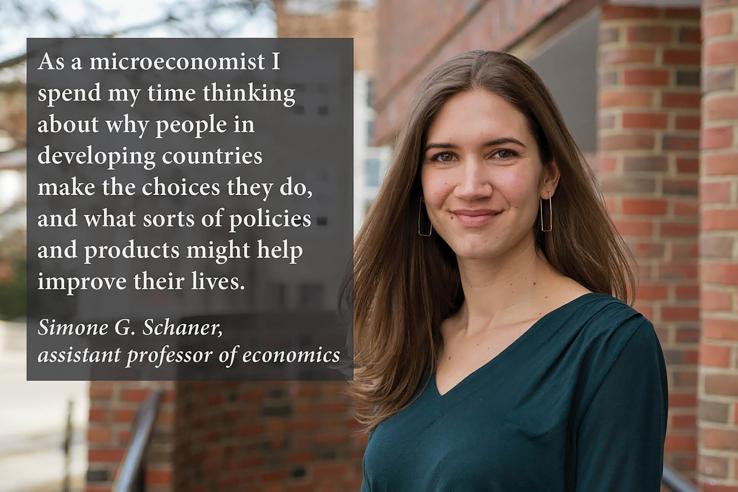Affiliate spotlight: Simone Schaner on her health behaviors research

Simone Schaner is an assistant professor of economics at Dartmouth College and the University of Southern California. She has been a J-PAL affiliate since 2013.
How did you become interested in development economics?
My interest started when I took development economics as an undergraduate. A big thank you to Garance Genicot at Georgetown for introducing the subject in such an inspiring way! I went on to write my economics senior thesis on microfinance—which let me spend some time in the field in Bangladesh—and I’ve been hooked ever since.
What is one current research project that you're particularly excited about?
It’s hard to pick just one!
Jessica Leight at American University and I are partnering with the Government of Tamil Nadu to evaluate the impact of several behavioral change communication strategies to increase rates of exclusive breastfeeding. We’re particularly interested to understand whether engaging older women (mothers and mothers-in-law) with information about benefits of breastfeeding is more effective than targeting new mothers alone.
I’m excited about this project because it will give us a way to study the intergenerational transmission of health norms, which has been of interest to me for a long time, and because the partnership with the state means that our interventions could be replicated at scale if they’re effective.
I’m also excited about a project on adherence to diabetes treatment that I’m working on with Dan Bennett at USC. This randomized evaluation offers participants different combinations of framed information about diabetes and reminders to take treatment. The design will allow us to measure willingness to pay for reminders and treatment effects of reminders conditional on willingness to pay.
This will let us test our working hypothesis for why adherence to treatment is often so low: that taking treatment forces you to think about your illness. This could impose high psychic costs relative to simply pushing the illness to the back of your mind and pretending that it’s not an issue.
What is your dream evaluation?
I would really like to add more work on violence against women to my research portfolio. It’s been a secondary outcome of interest in some of my past work, but never the central focus to date.
I’m especially interested in studying the “transitional dynamics” of household conflict and violence—that is, when a household experiences some shock (e.g., a women’s empowerment program or a major economic event like an unexpected change in household income), how does conflict evolve immediately following the shock and then over the longer run? The evaluation would need to collect data on household conflict on a high-frequency basis and randomize the timing of an intervention that delivers a shock to the status quo.
I’m currently working on getting a project like this started, so fingers crossed things work out!
What is one of your most memorable stories from the field?
A few years ago I was in Kenya doing scoping work for a commitment savings project. We visited the compound of a local family, who invited us in, fed us tea and avocados, and spoke with us for over an hour.
After, the husband offered to gather a bunch of his neighbors for a group discussion. He rounded people up and we spent another couple of hours in his courtyard discussing everyone’s aspirations and savings plans. I was so struck by his generosity, both with his home and his time.
I’ve had a number of experiences like this over the years—they serve as a great reminder that our work would not be possible without the willingness of participants to donate their time in service of research that often has no immediate benefit for them.